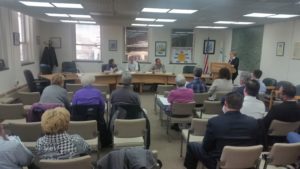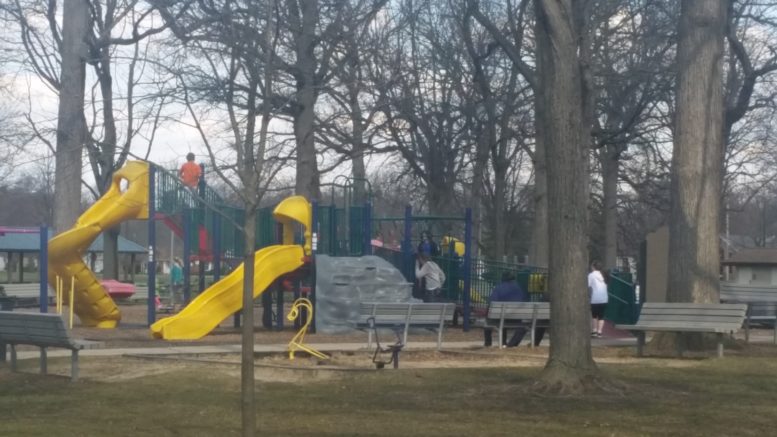By JAN LARSON McLAUGHLIN
BG Independent News
BG officials did not question the need for a new parks and recreation levy Monday evening. They did, however, question the chances of the millage increase passing on the November ballot.
City council’s finance committee listened to BG Parks and Recreation Director Kristin Otley as she made the pitch for a 2-mill property tax levy lasting five years.
Since the proposed levy is an increased amount from the current 1.4-mill levy, the council committee felt the need to scrutinize the request.
Otley explained that the parks and rec program has not seen a levy increase in 16 years. In the meantime, the program has grown in acreage, facilities and programming.
“We’ve added so much in 16 years,” Otley said. “The things we added were all things the community was asking for and wanted to see.”
Also during that 16-year period, several maintenance projects were deferred.
“A lot of things have been put off,” Otley said.
For example, the Veterans Building in City Park is in great need of repairs. The parking lot at Simpson Garden Park has serious pothole problems. The park land has grown to 333 acres, including the new Ridge Park. And the 10-year-old community center is in need of maintenance.

Kristin Otley explains levy proposal to city council’s finance committee.
The three members of the finance committee, Robert McOmber, Michael Aspacher and Theresa Charters Gavarone, did not dispute the need for the additional millage. But they expressed concern that if voters don’t support the levy, that the department will be left with no levy revenue since the current levy has expired.
“It’s the first time we’ve gotten ourselves in a position where we only have one shot,” at the levy, McOmber said. “People don’t have to vote yes just because you need it.”
McOmber suggested that perhaps other options should be considered rather than the 2-mill levy, such as a lesser 1.8-mill levy, or two levies that add up to 2 mills. In that case, if voters feel they can’t afford the entire 2 mills, they may at least continue supporting the original 1.4-mill amount.
“I don’t think that’s a slam dunk,” McOmber said of the levy’s chances. He also expressed concern about the levy sharing the ballot with the presidential race. “There are angry voters out there.”
But Nadine Edwards, a member of the park levy committee, said the city can market the parks as something positive to vote for at the polls.
Jodi Anderson, also of the committee and formerly of the park board, said the board intentionally avoided a millage increase during tougher economic years. Now is the time to ask for enough millage to keep maintaining the programs that citizens have come to value, she said.
Anderson said a quality campaign can convince voters to support the parks. “You can trust that your money is going to a good investment.”
Bob Callecod, recalled the 1990 park levy campaign when similar concerns were expressed.
“I’m just confident the citizens will continue to support a quality park and rec department,” Callecod said.
Park board member Jeff Crawford told the committee the board had already vetted the millage amount, and felt it was the most reasonable request.
Otley pointed out that the parks and recreation department is operating with a deficit.
“That physically pains me – every fiber of my body,” she said.
The current levy generates $637,400 a year. A 1.8-mill levy would bring in $820,800, and a 2-mill will generate $912,000.
The 1.8-mill levy will erase the department’s deficit of $124,700. So the voters will need to be convinced why more is needed, the park officials were told.
“There’s nothing real sexy,” just maintenance and upkeep of aging buildings, Otley said. “They’ve been put off, but eventually we need to pay the piper.”
Otley agreed that the department probably should have asked for more millage before this. “But the economic climate was not such that they felt comfortable asking for more.”
Consequently, the department increased some park and rec fees, with some of them being so high that it has led to decreased usage, such as building rental fees.
The 2-mill levy would cost the owner of a $150,000 home about $91 a year.
“It comes down to what is the value of $91 a year,” Otley said.
If the levy fails to pass, the department would have to look at decreasing hours, cutting seasonal staff and increasing fees.
“That would be extremely painful,” she said.
The department already relies on park foundation funds for some projects. “Quite honestly, we’d be in dire straits right now” without those funds, Otley said.
The council committee assured the park officials that they see the need, but just want to give the levy the “best chance of success,” Aspacher said.
Gavarone agreed saying with the long list of maintenance projects, “it will be easy to use those extra funds.”
Council as a whole will discuss the levy millage on April 4.

